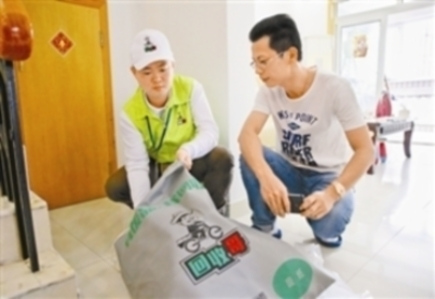
A worker of O2O waste collection Recycling Brother offers door-to-door services in Shenzhen, South China's Guangdong province. (Photo/sznews.com)
A new O2O application has shown its potential to help build a circular economy with more recycling, but obstacles remain for the recycling industry to innovate.
"If all the garbage generated in Chinese cities this year were loaded on trains, the length of all the trains would equal twice that of the equator," said Chen Laying, a sanitation worker and deputy to the National People's Congress, during this year's two sessions.
Chen's voice raised one of the major problems in Chinese cities' development – the unchecked and fast rising amount of garbage which threatens the environment and human life.
As a result of rising living standards, garbage in Chinese cities has been rising at almost the same pace as the country's GDP – around 10 percent in recent years. From 1979 to 2013, the amount of garbage disposed of every year has jumped from 25 million tons to 173 million tons.
More than 90 percent of refuse with recycling value has not been recycled, according to Wang Jiwei, secretary general of China Association of Circular Economy. Most waste ends up in a landfill or incineration plant, using up large areas of land and polluting the environment, he said.
Inconvenience
In Chinese cities, most of the recyclable garbage thrown away are either collected by scavengers who earn a meager income from the business or sold to small waste collection agencies by the owners themselves. Waste sorting is done in a random and disorganized way.
Waste sorting and collection is an unpleasant experience for many due to a lack of professional guidance and service and low profits.
"Sometimes, I have to drive my car with all the plastic bottles and piles of cardboards to waste collection agencies several blocks away, only to receive a dozen yuan," said Wu Yue, a senior Beijing resident.
"It is even worse in bad weather when going out becomes difficult for me," said the 60-year-old.
But a new O2O (online-to-offline) application has changed the attitudes of people like Wu towards waste sorting and recycling.
New platform
Ever since he began using Bangdaojia, an application that allows users to request a garbage pickup on their smart phones, Wu has been spared the effort to find waste collectors on the street or drive miles to the nearest waste collection agency.
The O2O platform also helps trash collectors locate their customers. The developer of the app, Beijing Incom Resources Recovery Co Ltd, offers trash collectors formal employment and allows them to provide door-to-door services by appointment.
Jin Yuhua and her husband have worked as trash collectors since they moved from Shandong province to Beijing in 1997. Life is hard for them – in sweltering heat and freezing cold, they sit on an old tricycle outside a housing compound, waiting for someone to sell them rubbish with tradable value.
Since using the app, the couple went from aimlessly wandering in the street to offering door-to-door services by receiving orders on the O2O platform.
In addition to providing a platform to link customers and trash collectors, the O2O application is also changing the final destination of the rubbish, Incom general manager Chang Tao told Xinhua News Agency.
Garbage collectors are the start of the long recycling chain. They usually sell garbage to small waste collection agencies, which will resell it to recycling enterprises. As the costs for processing recyclable materials is high for licensed recycling enterprises, says Chang, the prices they offer are less competitive than unlicensed agencies. As a result, a lot of garbage goes to underground collection and processing centers.
"I have been to some illegal processing centers on the outskirts of Beijing that exude a pungent smell. They don't have sewage treatment or proper environmental protection facilities. The chemicals are discharged into rivers or the earth, causing secondary pollution," Chang says.
"Incorporating Internet technology into the recycling chain not only expands the raw materials base, but also shows us who is recycling and where. We use the Internet to monitor recycled garbage and make sure it goes to legitimate factories where it is processed without pollution."
Upgrading the industry
More than eight cities, including Beijing and Shenzhen, have been exploring refuse classification since 2000, but so much is still discarded randomly due to the lack of workable methods and poor public awareness.
The O2O platform's detailed refuse classification system to some extent solves the problem of incomplete waste sorting, said Zhang Yuping, general manager of another O2O platform Recycling Brother.
With its detailed refuse classification, Recycling Brother has attracted the participation of more than 3,000 offline garbage collectors in cities including Shenzhen and Wuhan, and the platform's daily collection reaches 300 tons.
The rewards for selling garbage will promote the "trash-to-treasure" concept and encourage more people to participate, said Zhang.


















































